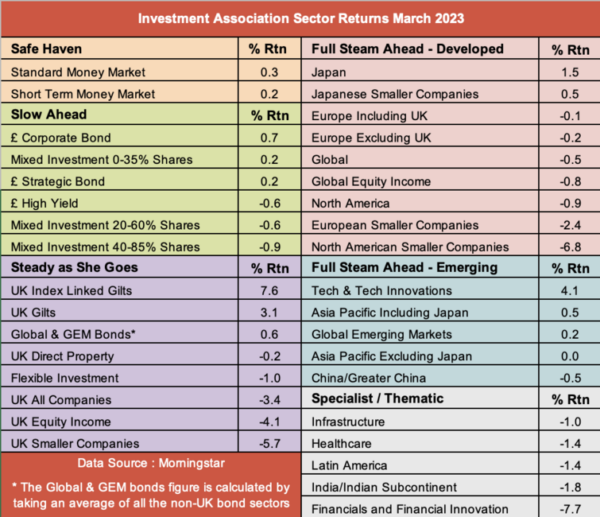Apr
2023
Gilts and gold funds shine during flight to safety
DIY Investor
5 April 2023
Most sectors lost money in March, but some specialist funds bucked the wider trend.
Last week, we highlighted a number of tech funds that looked on track to be the best-performing funds for the first quarter of 2023, and that turned out to be the case. The Technology & Technology Innovations sector is also one of the few that went up in January, February and March. There are only two others, Standard Money Market and Short Term Money Market.
However, last month the best-performing funds were from the Investment Association’s Specialist sector. This sector contains “funds that have an investment universe that is not accommodated by the mainstream sectors”. Because of this the IA has decided that “performance ranking of funds within the sector as a whole is inappropriate, given the diverse nature of its constituents”.
We do include the funds from the specialist sector in our regular analysis of the most widely available UK domiciled unit trusts and OEICs. Last month, four found their way to the top of our top 10 table. At Saltydog, we call them the ‘gold’ funds although they do not just hold physical gold. These funds typically invest in companies involved in exploring, mining, processing, or dealing and investing in gold and other precious metals.
Top of the table is the Ninety One Global Gold fund with a one-month return of 14.9%.
Saltydog’s top 10 funds in March 2023
| Fund name | Investment Association (IA) sector | Monthly return (%) |
| Ninety One Global Gold | Specialist | 14.9 |
| BlackRock Gold and General | Specialist | 14.4 |
| SVS Sanlam Global Gold & Resources | Specialist | 14.2 |
| LF Ruffer Gold | Specialist | 12.7 |
| Janus Henderson Index-Linked Bond | UK Index Linked Gilts | 8.4 |
| iShares Index Linked Gilt Index | UK Index Linked Gilts | 7.9 |
| L&G Global Technology Index | Technology & Technology Innovation | 7.8 |
| M&G Index-Linked Bond | UK Index Linked Gilts | 7.3 |
| CT UK Index Linked | UK Index Linked Gilts | 7.2 |
| L&G All Stocks Index Linked Gilt Index | UK Index Linked Gilts | 7.1 |
Data source: Morningstar. Past performance is not a guide to future performance.
The table also contains five funds from the UK Index Linked Gilts sector and one from the Technology & Telecommunications sector.
Overall, fund performance has deteriorated over the past couple of months. In January, more than 95% of the funds we analyse made gains. That figure dropped below 50% in February and last month it was down to 36%.
This general slowdown is reflected in our latest sector analysis where most sectors made losses in March. The best-performing sector was UK Index Linked Gilts, which made 7.6%, followed by Technology and Technology Innovations, up 4.1%, and then UK Gilts, up 3.1%.

When performance is deteriorating for most fund sectors, there is more of an incentive to hold cash or invest in the money market funds, and that is what we are doing with our demonstration portfolios. We are now in a position where our most cautious portfolio, the Tugboat, is holding 93% in cash or the money market funds. Even in our slightly more adventurous Ocean Liner portfolio, the amount has increased to 84%.
A major influence on the markets last month was the collapse of a couple of banks, and fears of a more widespread banking crisis. One of the first to go was Silicon Valley Bank.
In the UK, bank deposits of up to £85,000 per person, per bank, are protected by the Financial Services Compensation Scheme. A similar system operates in the US called Federal Deposit Insurance Corporation insurance. The FDIC was founded in 1933 and is an independent agency created by Congress to maintain stability and public confidence in the nation’s financial system. Its insurance covers up to $250,000 per depositor, per institution.
One of the unusual things about the Silicon Valley Bank was that over 95% of the deposits were in excess of the FDIC limits, and so were not insured. In the end, the government and Federal Reserve intervened and promised to make sure everyone got all their money back. However, they did not have to, and it suddenly raised the issue of whether bank deposits were safe. Not just in Europe, but all over the world.
When people are concerned about how safe their money is in the bank, they look for alternate ways of preserving their wealth. Historically gold has always been popular, because it is widely accepted and internationally recognised. Another option is government bonds. The UK government has never defaulted on its interest or capital payments.
There are probably other contributory forces in play, but the recent banking crisis has probably been one of the most significant factors in the increasing value of the gold and gilt funds in the last month. Although they are seen as safe, because you are very unlikely to lose everything, that does not mean that in the short term the prices cannot fluctuate wildly. Although UK Index Linked bonds were the best-performing sector last month, it is worth remembering that in 2022 they went down by 35%.
For more information about Saltydog, or to take the two-month free trial, go to www.saltydoginvestor.com
Leave a Reply
You must be logged in to post a comment.